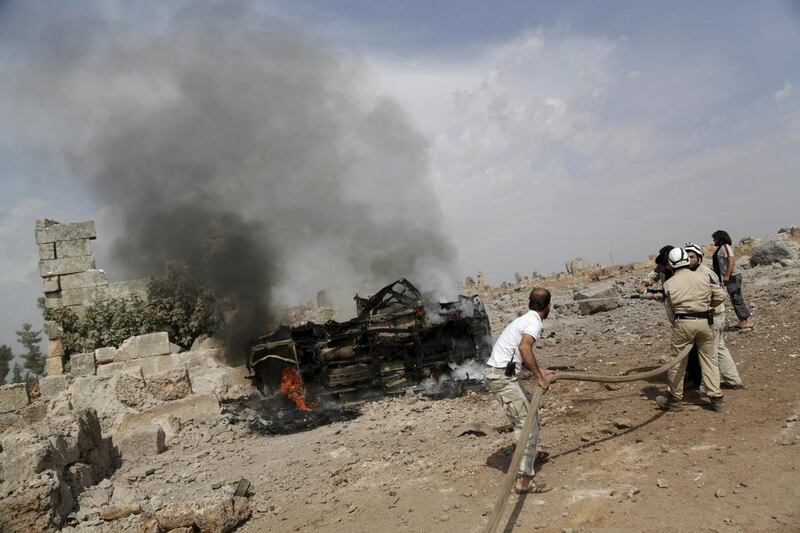The Pentagon held talks with Russia on Thursday as Moscow unleashed fresh air strikes on targets in Syria, with both parties discussing ways to avoid their forces firing on each other.
When Russian jets began their bombing campaign on Syria a day earlier, US secretary of state John Kerry – appearing with his Russian counterpart next to him – warned Moscow that Washington would have “grave concerns” if the Kremlin targeted moderate rebels opposing the regime.
However, he added, the Obama administration would welcome “any genuine effort” by Moscow to fight the extremist group ISIL.
The mixed signals that the US sent – with Mr Kerry appearing alongside Sergey Lavrov as the Russians announced the strikes, and the confusing US stance on them – could be read at worst as tacit endorsement, and at the very least, horrible optics that will further erode already low credibility among Syrian rebels backed by Washington, its Arab and European allies.
Washington is undoubtedly embarrassed and wrong-footed by Russian president Vladimir Putin’s opportunistic move to take advantage of the US-led campaign that has largely failed to roll back ISIL or push Bashar Al Assad to negotiate.
However, US officials also view the move as a folly bound to fail in the longer term, that could do more to hamper Russia’s geopolitical strategy rather than empower it.
“Knock yourselves out,” one White House official said derisively of Russia’s direct entry into the Syrian quagmire.
Still, the fallout could be disastrous, not only for the long suffering Syrian people, but also for security and stability in the Middle East.
Russia had claimed during the build-up of military personnel, fighter jets and attack helicopters over the past three weeks that its only target would be ISIL militants – and that they would coordinate with the US so as to avoid accidents.
But on Wednesday, just an hour before the Kremlin launched its air campaign in Syria, a Russian general in Baghdad got in touch with US counterparts across the street to inform them that Russian fighter jets in Syria would soon begin bombing, and that American planes should get out of the way.
Lt Gen Robert Otto, the deputy chief of staff for intelligence and surveillance for the Air Force, said any agreements reached in the Pentagon talks would be reflected in the US-led coalition’s air operations, which including daily strikes on ISIL targets in both Syria and Iraq. He does not believe there will be any real intelligence-sharing with Moscow.
It quickly emerged after the first bombs landed in Syria on Wednesday that they were targeted at a moderate FSA group north of Homs city, backed by the CIA’s train-and-equip programme.
“Hasn’t most of the Free Syrian Army joined [ISIL]?” asked a Russian spokesman.
If this cynical analysis guides Russian targeting of rebels, it could galvanise support for extremist groups, and draw even more radicals from Central Asia and elsewhere hoping to pull off an “Afghanistan II” on Russia.
“These air strikes will extend the life of the war as a first step,” said Bashar Al Zoubi, who commands one of the largest mainstream rebel groups fighting in southern Syria under the Free Syrian Army banner.
“As a second step, they will spread extremism, because when the war becomes a global one against the Syrian people, it will not retreat from its goals, and there will be fertile ground to attract foreign fighters to fight the Russians,” said Mr Al Zoubi, a prominent rebel leader who also heads the Yarmouk Army – part of the FSA.
The air strikes could also potentially unite more moderate groups with extremist groups against their common enemy – a Syrian regime backed by Russia and Iran.
tkhan@thenational.ae
* with additional reporting from Reuters and Associated Press





